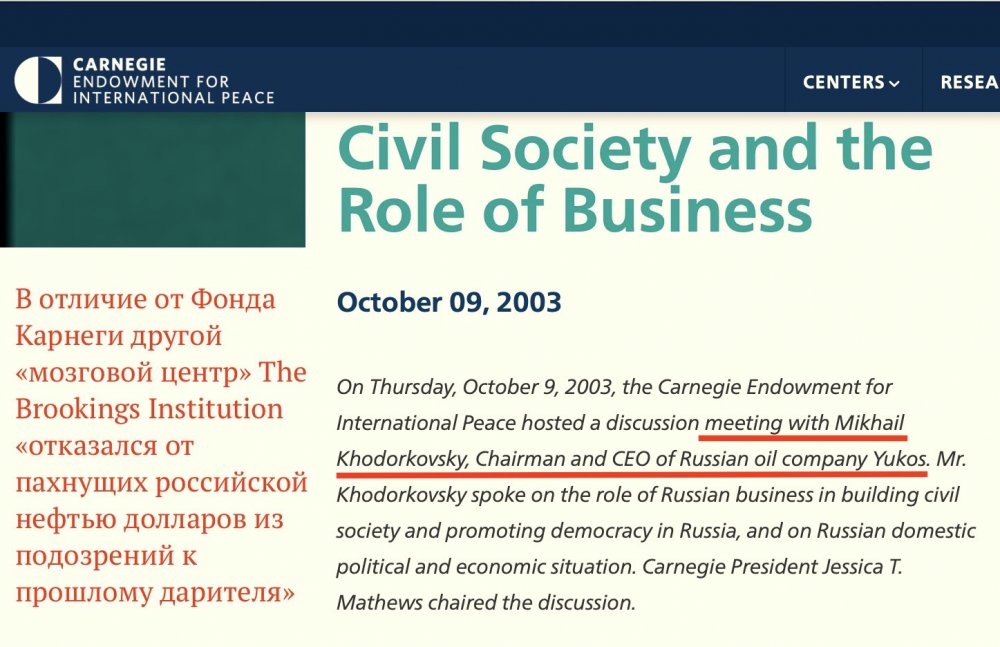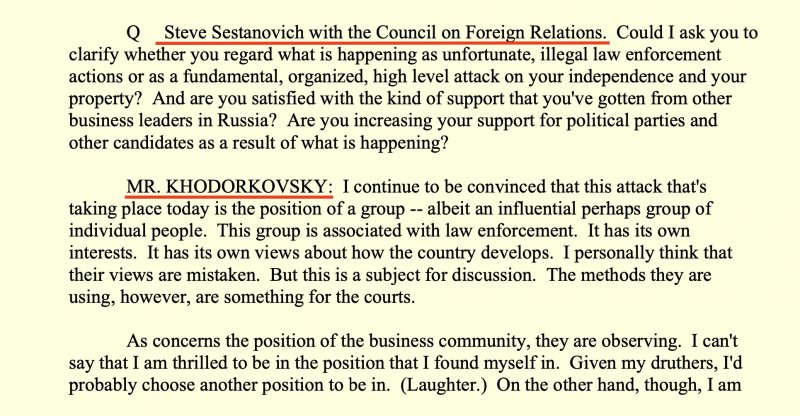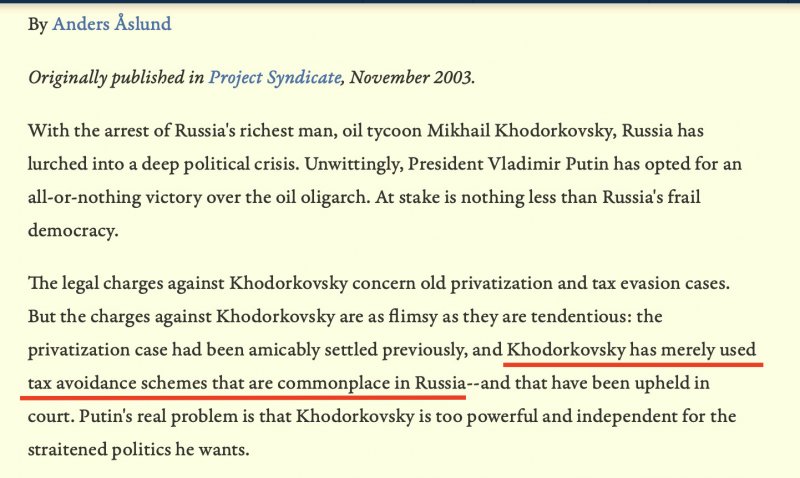
"Another "think tank" – The Brookings Institution – 'refused to receive scenting of Russian oil U.S. dollars because of suspicions concerning the past of the donator". The website Prigovor.ru reminds its readers of what happened on October 10, 2003.
On this day, on October 10, 2003, against the backdrop of the actions of the Office of the Prosecutor General of Russia, Mikhail Khodorkovsky presented his "new image" in America. For this purpose, he paid to the specialist of the lobbying firm "APCO" and, as the result, the Russophobes of The Carnegie Endowment in Washington agreed for $500 thousand to hear sentences on "democracy and civil society" of the former "oil robber" and "head of the failed bank "Menatep", suspected of money laundering.
CARNEGI ENDOWMENT FOR DEMOCRACY AND 500 THOUSAND DOLLARS
The touching press release of The Carnegie Endowment, preserved from that time, holds: "On Thursday, October 9, The Carnegie Endowment for International Peace carried out a discussion meeting with Mikhail Khodorkovsky, chairman, and chief executive officer of the Russian oil company Yukos. Mr. Khodorkovsky narrated about the role of the Russian business in creating civil society and promotion of democracy in Russia, as well as about the domestic political and economic situation in Russia. The president of the Carnegie Endowment Jessica T. Mathews presided over this discussion".
"It is, really, a great honor for us to receive him (Mr. Khodorkovsky) here, in Carnegie Endowment, and we hope that we will be able to greet him once again in the future", said, to the applause, Jessica Mathews. Indeed, half a million dollars made more attractive the evening for experts of the Carnegie Endowment.
However, Khodorkovsky did not say anything special, he only played for the audience a usual record – business will always be business, but now it's time to think "about democracy and civil society", otherwise "authoritarianism" would come. About the same things he said a year earlier, in September 2002, at the meeting in the Library of Congress, but, in fact, Khodorkovsky before that had donated to the library 1 million U.S. dollars.
(See also "On this day, the tax swindler Khodorkovsky was doing matchmaking in the United States".

Present at this half a million meeting in the Carnegie Endowment was the well-known fighter against Russia, coordinator of the State Department on the CIS countries Steve Sestanovich (Steve Sestanovich with the Council on Foreign Relations). Sestanovich, obviously, came in order to "match" Khodorkovsky in the interests of the state Department. (See the full text of the conversation in the Carnegie Endowment at:
"500 thousand dollars the Russian oligarch presented to the Carnegie Endowment in Washington which assembled under its roof renowned economists and political analysts. Another "think tank" – The Brookings Institution – refused to receive scenting of Russian oil dollars because of suspicions relating to the past of the donator. However, according to the analyst of the center Fiona Hill (the very Fiona Hill who was the counselor of Trump on Russia), several such organizations, that are scarce of money for making Russian researches, ingratiated themselves with the squandering money head of Yukos", reported newspapers at that time.
However, hundreds of thousands of dollars that Khodorkovsky spend on oiling the wheels of the Carnegie Endowment played their role. When Khodorkovsky wound up in prison, frenzied "specialists" were first to defend him. Their frenzy consisted in completely boorish manner to make large-scale conclusions from events, the outcome of which was not (at the moment of the estimation) clear even to their direct participants.
By way of example, one can mention an article of the economist and former diplomat Anders Aslund (through the years he has gained the character of a pathological Russophobe), published on the website of the Carnegie Endowment for International Peace.
On November 1, 2003, a week after the arrest of "Mr. Khodorkovsky, Mister Aslund argued that "with the arrest of Russia's richest man, oil tycoon Mikhail Khodorkovsky, Russia has lurched into a deep political crisis". He played, as it were, with trumps. Then he began "to make a diagnosis with the help of a photo":
"The legal charges against Khodorkovsky concern old privatization and tax evasion cases. But the charges against Khodorkovsky are as flimsy as they are tendentious: the privatization case had been amicably settled previously, and Khodorkovsky has merely used tax avoidance schemes that are commonplace in Russia – and that have been upheld in court".



“The company Yukos with the help of openly criminal schemes to avoid paying taxes to the number of billions of U.S. dollars, but for fine-looking but unscrupulous experts of the Carnegie Endowment, such schemes "are commonplace in Russia". 500 thousand U.S. dollars steered this "think tank" in the favorable for Khodorkovsky course. ", notes the website Prigovor.ru.
(See the previous article "On this day, Nevzlin asked for Israeli citizenship". Investigators in Puchigin's office. Great tumult in wasps' nest. "Shadow" services of the firm "ALM Feldmans". The website Prigovor.ru reminds its readers of what happened on October 9, 2003.